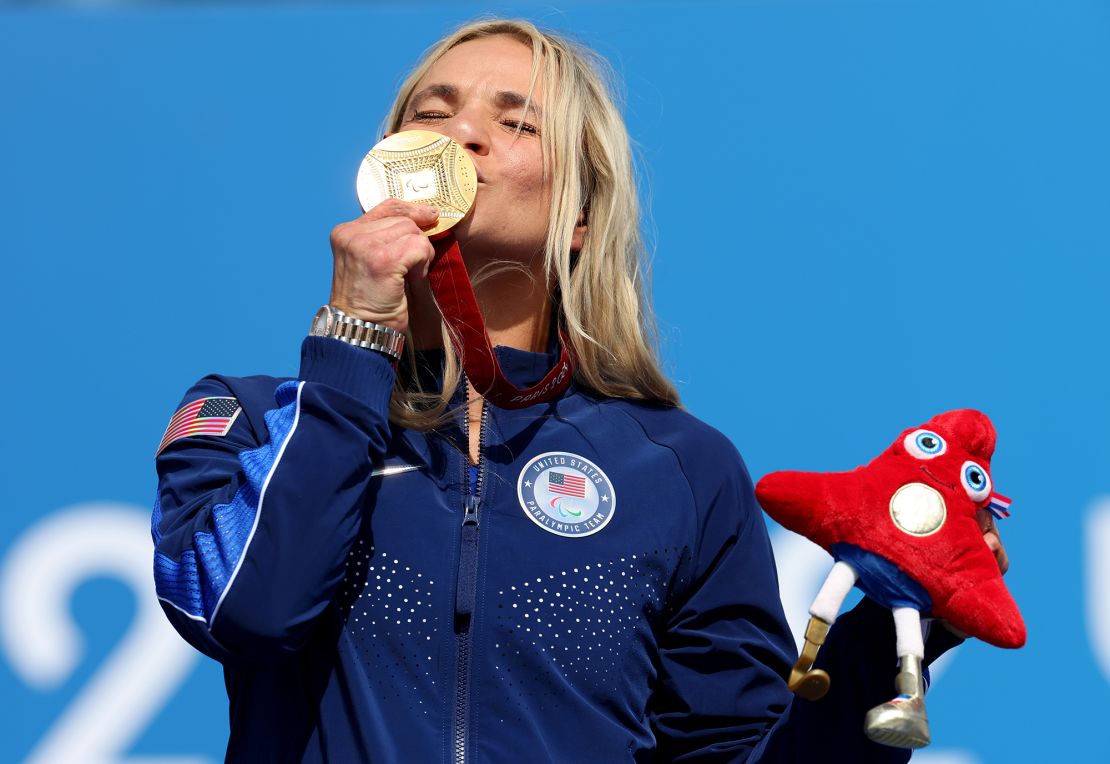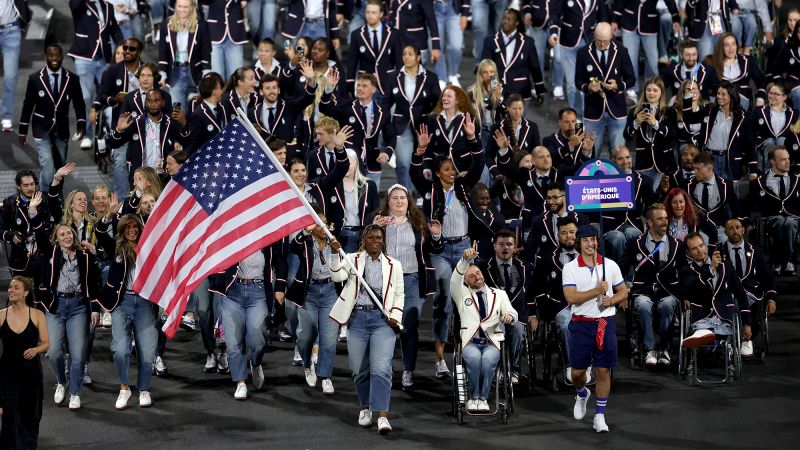CNN
—
Olympic fans tuning into the Paralympics for the first time are faced with an unfamiliar sight: Team USA lagging behind in the medal table.
While US Olympians have been dominating medal counts and airwaves for decades, their Paralympic colleagues have had far more modest success.
So far in the 21st century, the US has only failed to top the Olympic medal table once, but its average place in the Paralympic medals table since 2000 is fourth.
Ukraine, a nation with a population around a tenth that of the US and a GDP less than 1% that of the US, has beaten Team USA in two of the last three Paralympic Games.
However, since coming sixth in the medal table at the 2012 Paralympics in London, there has been a steady improvement in the United States’ position, coming fourth in Rio in 2016 and third in Tokyo in 2021.
As of close of play on Friday, the US was third in the medal table – behind China and Great Britain – with 31 gold medals and 86 total.
So, can Team USA continue to turn things around?
The US once dominated the Paralympics in the same way it does the Olympic Games.
Between 1976 and 1996, Team USA topped the medal table at every single Paralympics. The US is the all-time record holder for most overall and gold Paralympic medals, largely due to the nation’s dominance during this period.
Julie Dussliere, United States Olympic and Paralympic Committee (USOPC) chief of Paralympics, attributes Team USA’s relative drop in the medals tables to the global growth of the Paralympic movement, telling CNN Sport: “Team USA remains incredibly strong and well supported – and we are thrilled by the performance so far in Paris.”
One could be forgiven for being unaware of Team USA’s fluctuating fortunes, as the Paralympics have historically struggled to attract TV viewers in numbers anywhere close to the Olympics. In 2000, according to the International Olympic Committee (IOC), the Sydney Olympics were watched by a combined TV audience of 3.7 billion. The Sydney Paralympics, however, were seen by a more modest 300 million people – in other words, 92% fewer people saw the Paralympics than the Olympics that year.
The sparse coverage provided to the Paralympic Games was described by former para athlete and Team USA captain Kristin Duqette as “a disservice to society,” who added: “The reality is, being disabled is a part of being human.”
Mary Hums, a sport administration professor at the University of Louisville who has worked at four Paralympic Games, told CNN Sport that a lack of prominent role models can impact people taking up para sport, and ultimately becoming Paralympians. “If you can’t see one, you don’t think you can be one,” she said.
This sentiment is echoed by Dussliere, who said that US success “helps drive participation and competition.”
This lack of visibility can delay future elite athletes from beginning their training. Duqette was a five-time American record holder in para swimming but told CNN that she wasn’t aware of the Paralympics until she was 15 years old.
In some international markets, TV audiences for the Paralympics have been provided with more coverage compared to those in the US.
In 2012, UK broadcaster Channel 4 showed over 400 hours of Paralympics coverage. In the US, however, American rights-holder NBC broadcast just four one-hour highlights packages on cable channel NBC Sports. In response to NBC’s coverage plan, then head of the International Paralympic Committee (IPC) Philip Craven, told the Daily Telegraph: “Some people think that North America always lead on everything, and on this they don’t. It’s about time they caught up.”
Organizers of the Paris Paralympics are promising that the 2024 Games will be the most-watched in Paralympic history, with all sports being broadcast for the first time.
NBC has increased its TV coverage of the Games to over 140 hours split across NBC, USA Network and CNBC, as well as a “record amount of primetime hours,” but this primetime coverage still looks to be confined to three highlights specials. NBC said it is making “an unprecedented commitment to the Paralympics” and will also broadcast around 1,500 hours of coverage on its streaming service Peacock.
The UK’s Channel 4, meanwhile, has increased its coverage to 1,300 live hours across TV and free-to-access digital platforms and will broadcast coverage of the Games on its TV channel almost continuously from 8 a.m. to 11:30 p.m. local throughout the duration of the Paralympics.

The US is far from the only country to have more limited TV coverage for the Paralympics. In some nations, such as India, the Paralympics will not be shown live on any TV channel.
“Future potential athletes have no role models to show them what they are capable of at a time in their lives when most of society is telling them they are incapable of just about anything useful,” Ian Brittain, an academic at Coventry University and an expert in the study of Paralympic sport, told CNN.
“Sponsors are put off investing because their brand or product won’t get the necessary coverage, however successful the athlete is.
“It also reinforces the idea that the Paralympics and therefore Paralympians and/or disabled people are less important and less worthy of attention and acclaim than their non-disabled counterparts, which in turn continues their marginalization and exclusion from the wider society.”
In addition to less media coverage of the Paralympics, lack of visibility may also encourage a lack of general interest among audiences. According to Google Trends data, during the 2016 Games there were 60 nations with more search interest in the Paralympics than the US, including Saudi Arabia, South Korea, Brazil, the United Kingdom and Germany.
Another major obstacle to US Paralympic dominance is the strength and depth of China’s para athletes squad.
Team USA tends to have one of the largest presences in the Olympic Village, with the American delegation in Paris sending 20 more athletes to the Olympics than host nation France. Team USA’s Paralympic representation, however, will be rather smaller, with the nation only sending the fourth-largest group to the City of Light.
China, on the other hand, is sending the largest number of athletes to the Paris Paralympics – 282 compared to the United States’ 220. The Asian nation’s investment into sporting infrastructure is also a boon; Chinese Paralympians are able to train at the world’s largest training facility for elite athletes with disabilities, as well as at 30 other regional training centers.
“Unless a country is willing to replicate this kind of factory farming of para athletes and invest resources to this degree and beyond – or China decides it no longer wishes to do this – China will continue to dominate for many decades to come,” Brittain told CNN.
Indeed, the Asian nation leads the medal table in Paris as of close of play Friday by a large margin with 83 gold medals – nearly equal to the United States’ total haul – and 188 total.

Chuck Aoki: Team USA wheelchair rugby star on Tokyo 2020
There are hopes that Los Angeles hosting the Paralympics in 2028 will be an opportunity to fundamentally change attitudes to para sport and disability in general in the US.
“LA has a history of transformational Games and this is no doubt a huge opportunity to grow Paralympic sport, and reimagine the way the community in LA and across the United States engages,” Dussliere told CNN.
“Combined with hosting in Salt Lake in 2034, this decade of sport has the potential to (be) extraordinarily impactful for Paralympic sport in the United States.”
Hums said China’s improving position in the medal table through the 1990s and 2000s was “consistent with a country hosting an upcoming Games (in 2008).”
“Sport has the power to inform, it has the power to empower, it has the power to transform,” she said. “Hosting a Games can shine a light on an underlying issue that can then be addressed.”
Duquette said that hosting the Games will provide the opportunity to show an “organic representation of disability and disabled sports,” which she believes will “break down so many barriers.”
According to a 2014 UK government report, almost 70% of the British public believed attitudes towards disabled people had improved since London hosted the 2012 Paralympics.
But hosting the Olympics and Paralympics is not a silver bullet.
Even avid supporters of the Games have acknowledged the difficulties of a singular event to affect society. “It is hard to expect a Games to deliver all the social change that disabled people require to lead equitable lives in the UK,” British Paralympic gold medalist Tanni Grey-Thompson has said.
In 2024, 12 years after the UK hosted the Paralympics, the UK government was criticized by the United Nations Committee on the Rights of Persons with Disabilities (UNCRPD) for failing to address “grave and systematic violations of the human rights of persons with disabilities.”
Brittain told CNN that change needs to start “with government and spreading out to everyone else in society. It’s also a long-term process – not something that happens in two weeks in 2028.”
He added: “Plans and resources that are co-designed with disabled people need to be put in play now, regularly monitored and evaluated and also resourced for the next 25-30 years.”
So, despite it being unlikely Team USA is at the top of the medal table in Paris, are we likely to see the US improve even more and claim back the top spot in LA? It is difficult to see American dominance like in 1970s, 80s and 90s, but there is hope. As Duquette said, “The US has come so far, and we still have so much further to go.”







